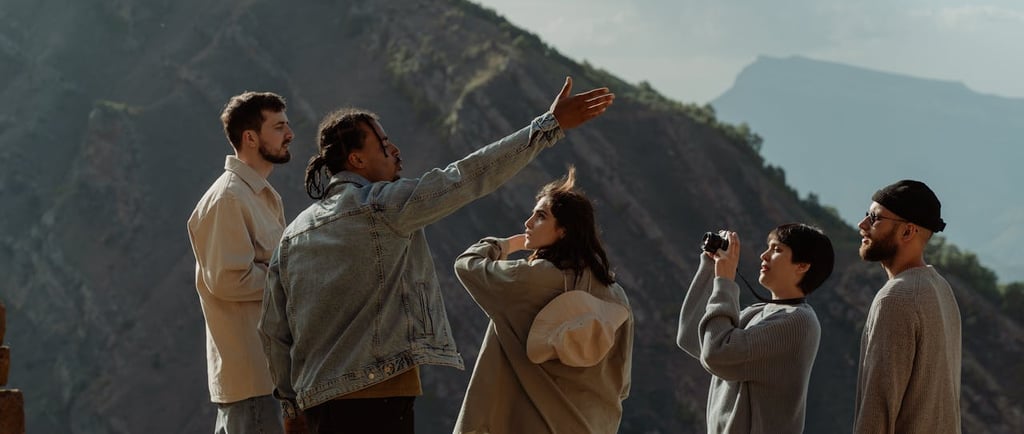How to Really Connect with Locals for a Deeper Travel Insight
It is about meeting people whose lives and stories feed the soul of a place, not just checking off landmarks. Connect with locals in a genuine way elevates trips into transformative experiences; it creates empathy and understanding of different ways of life. Here’s how to step away from shallow tourism and foster meaningful relationships.
3/10/20253 min read


1. Nurture a Sense of Cultural Curiosity and Humility
Learn the Language Basics
Even a few phrases such as “hello,” “thank you,” or “how are you?” show respect and effort. Use apps like Duolingo or Memrise before the trip. Making an effort to speak the local tongue is often appreciated by locals, breaking down barriers and opening the door to dialogues.
Research Cultural Norms
What hand signals are okay, what languages are used, does one dress up to go out? In Japan, for example, bowing is a sign of respect and in Thailand, touching someone’s head is a no-no. Discover the historical background so that you can ask informed questions and show real curiosity about their ancestry.
2. Get Involved in Local Places
Commonly Visit Non-Touristy Locations
Go to markets, neighborhood cafés, and public parks where residents congregate. Chat with the person next to you at a bakery in Paris or a tea stall in Mumbai. These settings provide unsanitized snapshots of daily life.
Engage in Rituals and Festivals
Experience local happenings, be it a religious ceremony in Bali or a harvest festival in Peru. Inquire politely if outsiders are welcome, and observe customs. Such involvement is likelier to create genuine connections and collective happiness.
3. Establish Genuine Relationships
Book Homestays or Community Tourism
Platforms like Homestay.com or local agencies pair travelers with families. Eating and sharing stories with local hosts — a Maasai family in Kenya, or another family living in a Vietnamese village — promotes cross-cultural exchange and mutual learning.
Hire Local Guides
Select from guides from the community, like a Lisbon chef who leads food tours or a Navajo guide who guides you through ancestral lands. They share insider perspectives and frequently connect you to their networks.
Volunteer or Participate in Workshops
Partake in community-driven projects, such as teaching English in Guatemala or weaving with artisans in Morocco. Steer clear of “voluntourism” by fact-checking altruism: initiatives should put local needs ahead of tourist saviorism.
4. Respond with Respect and Sensitivity
Observe and Adapt
Notice how locals interact. In some cultures, direct questions can feel intrusive; instead, tell a story that encourages reciprocity. In Japan, silence is golden, in Italy, the opposite.
Practice Active Listening
Ask them open-ended questions: “What’s your favorite tradition here?” or “How has this place changed in your lifetime?” Hear all without judgment, welcome varied perspectives.
Be Encouraged to Keep Privacy and Respect Boundaries
Always request the approval of people or sacred sites before you photograph. Dress conservatively in conservative areas to match the local culture.
5. Support Local Economies
Support Local Businesses
Dine at family-run places, shop at craft cooperatives, travel by local transport. In Oaxaca, purchase textiles from the weavers; in Istanbul, order tea at a çay bahçesi (tea garden).
Do Not Engage in Exploitative Practices
In markets, haggle respectfully and know fair prices. Choose sustainable tours that reinvest in local communities such as Indigenous wildlife safaris.
6. Embrace Slow Travel
Stay Longer, Dive Deeper
Stay for the week in the village instead of a day. Take a yoga class in Rishikesh, go fishing in Kerala, or volunteer at a vineyard in Argentina. Those repetitions breed familiarity and trust.
Engage in Daily Routines
Volunteer to prepare dinner, take care of a garden, or play soccer with children. These ordinary scenes become the richest memories.
7. Reflect and Share Stories
Journal Your Experiences
Write about interactions that tested your assumptions. Did a call in a Cuban casa particular open your mind to politics? Were you inspired by a Moroccan grandmother’s hospitality?
Share Thoughtfully
Share stories that humanize, not exoticize. Celebrate their humanity, don’t diminish them to cultural icons in the name of art when you know so little.
Conclusion: Meaningful Travel Can Make All the Difference
And real engagement takes risk, time, and honor. It’s about sacrificing convenience for connection, abandoning itineraries for spontaneity. When you focus on people instead of places, you’ll discover that the world is both smaller and richer. Take these connections with you when you return home, not only in the form of photos, but years in shifted perspectives — that despite our differences, we are all filled with the same hopes, fears, and joys.
By opening yourself to travel with humility and curiosity, you are no longer a visitor — you are a student of the world, forever altered by the stories you will tell, and the friends you’ll make.


Contact us
Copyright © 2025. Ralnoscape All rights reserved.
Destinations
Resources


Follow us
This website uses affiliate links which may earn a commission at no additional cost to you
